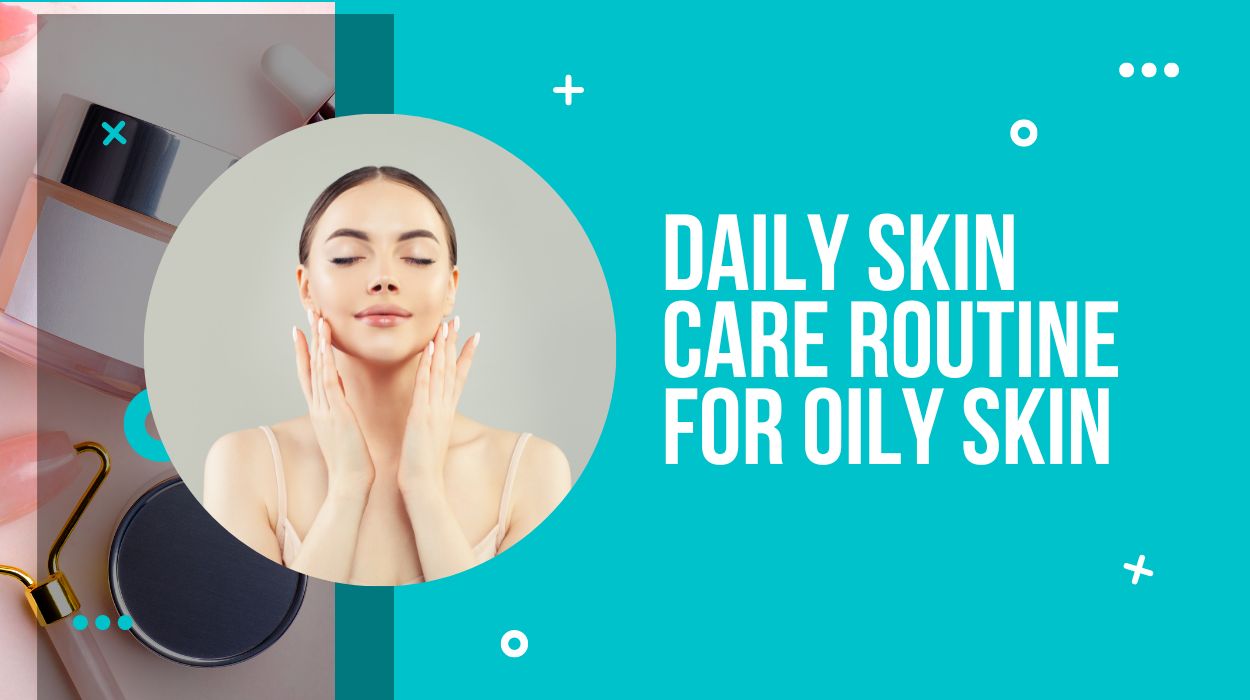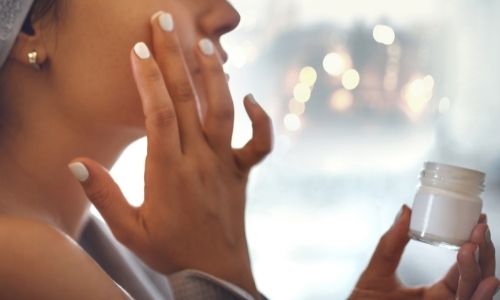Oily skin gives you a glow, but not the one you wish! Oily skin is an open invitation to blackheads, clogged pores, and acne! Do you have oily skin too? We understood your frustration when you screamed yes to that question! Dealing with oily skin can be a daunting task. However, we are here to make it easy for you!
A good daily skincare routine can ensure that you feel blessed to have oily skin! Keep reading along to find out the perfect skincare routine designed especially for oily skin!
Daily Skin Care Routine For Oily Skin
Step 1: Cleanse
Before applying anything to your face, you need to ensure it’s clean. Cleansing every morning helps get rid of the dead skin cells and the oil produced by the skin at night.
When using a cleanser for oily skin, it is essential to take a look at the ingredients. Oily skin should be exposed to only gentle cleansers. The cleanser should not rip off the hydration from the skin. Cleansers containing salicylic acid are mostly recommended for those with oily skin. Salicylic acid helps remove the excess oil and dead cells from the skin.
If you have acne-prone skin, using a cleanser with benzoyl peroxide is recommended. Glycolic acid unclogs pores and prevents breakout, and hence is a good option for those with oily skin. Cleansers containing fruit acids, tea or coffee extracts, and citrus extracts are the best products for those with oily skin. Nonetheless, if you have oily skin, ensure that you use foaming cleansers.
While cleansing, ensure that you cleanse your T-zone appropriately. Maximum oil secretion and buildup occur in the T-zone, and hence, cleansing it thoroughly is essential.
Author’s Tip: While choosing a cleanser for your oily skin, ensure that the cleanser is light-weight, non-comedogenic, gentle, fragrance-free, and sulfate-free.
Step 2: Tone
Yes! Oily skin needs hydration, too, and toner can ensure this hydration with a toner. Toners ensure that the oil in the skin is controlled, breakouts are prevented, and the skin doesn’t dry out. Our skin has a pH of 5.5.
Pollution, oil production, makeup, and alcohol can modify skin pH levels, thus undergoing a cycle of extreme dryness, followed by excessive oil production and environmental damage. Toners balance the skin pH. While oily skin leads to enlarged pores, toners work at tightening the pores and dissolving their appearance.
Toners create a layer of evenly toned skin. It prepares the skin to absorb the active ingredients from other products and is used before applying any other product. Nonetheless, toners reduce the damage that harmful UV rays might cause.
Toners containing rose, elderflower, lychee seed extract, aloe vera, eucalyptus, chamomile, almond oil, and honey are usually recommended for oily skin. An exfoliating toner also works well for oily skin. Exfoliating toners should contain salicylic acid, glycolic acid, or lactic acid. Do not use toners containing alcohol! Alcohol-based toners can irritate and dry out your skin.
Step 3: Apply Serum
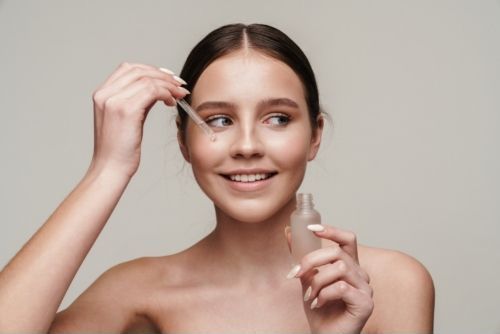
Serums are nothing but concentrates of nutrients, hydrators, and antioxidants that maintain the health of your skin. Serums repair uneven skin tone and texture. The thin consistency of serums ensures that they seep into the skin and provide it with nutrients.
Serums are highly potent and should be used in less quantity, 3-4 drops. Serums are applied on damp skin only. Serums containing witch hazel or tea tree oil and hydrating ingredients like Vitamin E and hyaluronic acid are recommended for oily skin. Serums containing collagen and vitamin C have anti-aging properties and make your skin look young and radiant. With serums, you need not worry! Your skin would be fresh, hydrated, and moisturized!
Step 4: Treat
Oily skin is one of the most sensitive skin types, and hence, taking its care is essential. Oily skin is more prone to acne. Oily skin treatment should be done after consulting a dermatologist or a doctor. Most of the treatment options for oily skin are available as OTC products.
Benzoyl Peroxide or Sulfur are mostly recommended for oily skin as they decrease oil production, preventing breakouts. Treatment with retinol is recommended for oily skin too. However, you should apply retinol at night time preferably. (More about it in the later section.)
Step 5: Moisturize
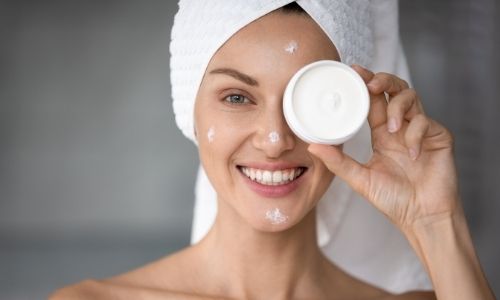
Moisturizing is one of the essential steps in a skincare routine. It smoothes the skin surface and forms a protective layer. Moisturizers even out the skin texture while decreasing skin oil production.
Use lightweight, oil-free, silicon-free, non-comedogenic, and water-based moisturizers. Oily skin people should prefer moisturizers containing squalene, aloe, or hyaluronic acid. Gel moisturizers are mostly recommended for those with oily skin.
Most moisturizers now contain SPF too. SPF ensures that the skin is protected from harmful sun rays. If you are using a moisturizer with an SPF of over 30, you do not need to use sunscreen. According to a study published in the Journal of Clinical and Aesthetic Dermatology, a moisturizer of SPF 30 is suitable for oily skin.
Author’s tip: Moisturizers should never be applied in circles or up-down directions. Use your fingers to spread the moisturizer outwards, starting with the cheeks.
Step 6: Apply Sunscreen
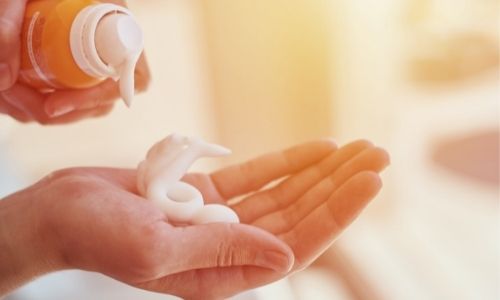
Sunscreens are a significant component to add to your daily skin regimen. Sunscreens ensure that your skin is protected from the sun’s harmful rays, thus reducing the oxidative damage that it might cause. Oxidative damage leads to skin aging.
Sunscreen with an SPF of 30 or more than 30 is recommended. Sunscreens containing titanium dioxide or zinc oxide helps prevent acne breakouts on oily skin. Vitamin C, fruit extracts, and caffeine-containing sunscreens are also excellent options for those with oily skin.
A light formula sunscreen should always be preferred over heavy and oily ingredients by those with oily skin. Nowadays, matte sunscreens are also available and can be ideal for those with oily skin! Stay away from sunscreens containing avobenzone, oxyphenone, benzophenone, methoxycinnamate, and para-aminobenzoic acid (PABA).
Night Time Skin Care Routine
A nighttime skincare routine is as essential as a daytime skincare routine. After a long day, it is essential to free your skin from dust, pollution and makeup. Nonetheless, our skin is continuously undergoing the cell regeneration process and is experiencing maximum blood flow at night.
Hence, any product applied at night is usually absorbed better and faster. Moreover, environmental stressors like pollution, dust, and sun rays are prevented. Thus, ensure that you follow the night skincare regimen as religiously as the day skincare routine.
Cleanser
Night skin care routine should start with cleansers too! Using gentle cleansers is essential to protect the natural and essential skin oil. A cleanser at night time will ensure that your skin has gotten rid of all the dust, pollution, and makeup.
Tone
Toning your skin at night is essential. Toning provides hydration to the skin and helps balance the skin’s pH. It also ensures better absorption of the other essential nutrients or skincare products.
An excellent hydrating toner is the one containing white tea and rose as they prevent acne breakouts. Toners containing BHA (beta hydroxy acid, like salicylic acid) are usually recommended for people with oily skin. Alcoholic toners are a big no for oily skin.
Eye Cream
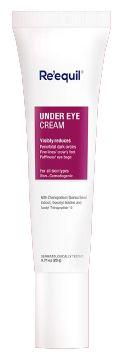
Eye creams are an essential part of the skincare routine. The area around the eyes is susceptible and is often prone to darkening and puffiness. Eye creams help prevent dark or puffy under the eyes, giving you a refreshed look for the morning! Eye creams containing caffeine or Aloe Vera gel are usually preferred for those with oily skin.
Retinol

Never use Retinol in the morning! Retinol makes skin sensitive to sun rays and may cause damage. Hence, use retinol only at night time. Retinol provides a nourishing cleanse, reducing the appearance of fine lines and wrinkles. They reduce sebum production and increase cellular turnover, improving blemishes and pigmentation.
Author’s tip: If you are new to using retinol, start with the ones containing 0.1-0.25% of Retinol.
Moisturize
Moisturizing your skin at night ensures that your skin is well hydrated for the night. You can also use a night cream in place of a moisturizer. The only difference between a night cream and a moisturizer is that night creams are thicker and may extend the absorption hours.
Both night cream and moisturizer ensure that your skin’s water isn’t wholly evaporated and your skin has adequate hydration for the night. However, ensure that your night cream is non-greasy and does not worsen your oily skin.
Frequently Asked Questions
What causes oily skin?
Oily skin is formed due to excess oil or sebum production on the skin. Oily skin can be attributed to various factors. However, genetics, age, humid and hot climate, using the wrong skincare products or overdoing them are the most common causes of oily skin.
Does drinking water help oily skin?
Drinking water is highly beneficial for those with oily skin. Drinking water helps maintain the oil and water balance of the skin. Thus, the oil or sebum production is reduced, and acne is prevented.
What food causes oily skin?
It might be shocking that food can also hamper oily skin; however, avoiding such foods can significantly help prevent oily skin. Dairy products, fried or salty foods, alcohol, and sugary foods are the most common culprits that may cause oily skin. Hence, avoid these foods to avoid oily skin!
Conclusion
Taking care of oily skin is a huge responsibility. A little carelessness leads to excess breakouts and damaged skin. Hence, maintaining and preparing your skincare routine for oily skin is essential.
A daily skincare routine for oily skin should include a morning and night regimen. The morning regimen should consist of cleansing, toning, applying a serum, treatment, moisturizing, and adding sunscreen. The night skincare routine should also start with cleansing and toning; however, you should add eye creams, retinol, and moisturizers.
Drop in a comment below and tell us your skincare routine for oily skin.

